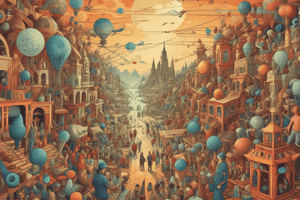Podcast
Questions and Answers
Urban life presented no significant difficulties for those uprooted from rural areas.
Urban life presented no significant difficulties for those uprooted from rural areas.
False (B)
The Industrial Revolution contributed to the increase in urbanization.
The Industrial Revolution contributed to the increase in urbanization.
True (A)
Early sociologists were mostly unconcerned with the effects of urbanization on society.
Early sociologists were mostly unconcerned with the effects of urbanization on society.
False (B)
Social changes from urbanization weakened the role of religiosity in society.
Social changes from urbanization weakened the role of religiosity in society.
Sociology emerged without any religious influence from its early practitioners.
Sociology emerged without any religious influence from its early practitioners.
Durkheim's work placed significant emphasis on the relationship between sociology and religion.
Durkheim's work placed significant emphasis on the relationship between sociology and religion.
The prestige of science in society increased during the development of sociological theory.
The prestige of science in society increased during the development of sociological theory.
The Chicago school of sociology is not associated with studying urban problems.
The Chicago school of sociology is not associated with studying urban problems.
The conservative approach in sociology places greater importance on the individual than on societal components.
The conservative approach in sociology places greater importance on the individual than on societal components.
The concerns of classical sociological theorists primarily revolved around social order.
The concerns of classical sociological theorists primarily revolved around social order.
According to conservative theorists, societal change is seen as beneficial and necessary for progress.
According to conservative theorists, societal change is seen as beneficial and necessary for progress.
Individuals are considered the most basic elements within society according to conservative perspectives.
Individuals are considered the most basic elements within society according to conservative perspectives.
The Industrial Revolution led to a decrease in the number of people moving from farms to factories.
The Industrial Revolution led to a decrease in the number of people moving from farms to factories.
Societal components are viewed as interdependent and their interrelationships are crucial for societal stability.
Societal components are viewed as interdependent and their interrelationships are crucial for societal stability.
Classical sociologists believed that societal components operate independently without interdependence.
Classical sociologists believed that societal components operate independently without interdependence.
The rise of capitalism was one of the significant factors that influenced early sociological theory.
The rise of capitalism was one of the significant factors that influenced early sociological theory.
Socialization is seen as a critical process through which society produces the individual.
Socialization is seen as a critical process through which society produces the individual.
Karl Marx, one of the major figures in sociology, was unconcerned with the changes brought about by the Industrial Revolution.
Karl Marx, one of the major figures in sociology, was unconcerned with the changes brought about by the Industrial Revolution.
The conservative political orientation suggests that any tampering with societal components is harmless.
The conservative political orientation suggests that any tampering with societal components is harmless.
Component parts of society are treated as isolated units that do not affect one another.
Component parts of society are treated as isolated units that do not affect one another.
Small social units have little to no influence on larger societal changes.
Small social units have little to no influence on larger societal changes.
Societal changes are encouraged by conservative theorists as ways to satisfy individual needs.
Societal changes are encouraged by conservative theorists as ways to satisfy individual needs.
A reaction against industry and capitalism led to the labor movement.
A reaction against industry and capitalism led to the labor movement.
Conservative political orientation was supported unanimously during the transitions caused by the Industrial Revolution.
Conservative political orientation was supported unanimously during the transitions caused by the Industrial Revolution.
Flashcards
Conservative emphasis on Society
Conservative emphasis on Society
Conservative thinkers prioritized society over individuals, viewing it as a complex entity with inherent laws and historical roots, rather than a mere collection of individuals.
Society as the primary unit
Society as the primary unit
Society, rather than the individual, was considered the fundamental unit of sociological analysis. Society shapes individuals through socialization.
Society's component parts
Society's component parts
Society isn't just people; it's composed of roles, positions, relationships, structures, and institutions. Individuals fill these parts within society.
Interdependence of social parts
Interdependence of social parts
Signup and view all the flashcards
Social Change as a Threat
Social Change as a Threat
Signup and view all the flashcards
Conservative political orientation
Conservative political orientation
Signup and view all the flashcards
Social order is important
Social order is important
Signup and view all the flashcards
Socialization shapes individuals
Socialization shapes individuals
Signup and view all the flashcards
Urbanization
Urbanization
Signup and view all the flashcards
Industrial Revolution
Industrial Revolution
Signup and view all the flashcards
Urban Problems
Urban Problems
Signup and view all the flashcards
Sociology's Interest in Cities
Sociology's Interest in Cities
Signup and view all the flashcards
Religious Change
Religious Change
Signup and view all the flashcards
Sociology and Religion
Sociology and Religion
Signup and view all the flashcards
Importance of Science
Importance of Science
Signup and view all the flashcards
Sociological Theory Development
Sociological Theory Development
Signup and view all the flashcards
Capitalism
Capitalism
Signup and view all the flashcards
Social Order
Social Order
Signup and view all the flashcards
Classical Sociological Theorists
Classical Sociological Theorists
Signup and view all the flashcards
Political Revolution
Political Revolution
Signup and view all the flashcards
Labor Movement
Labor Movement
Signup and view all the flashcards
Economic Bureaucracy
Economic Bureaucracy
Signup and view all the flashcards
Free Marketplace
Free Marketplace
Signup and view all the flashcards
Study Notes
Classical Sociological Theory: The Early Years
- Sociology is deeply shaped by its social context.
- The French Revolution and subsequent 19th-century political changes greatly influenced the development of sociological thought. Theocentrists, disturbed by the chaos, sought to reinstate order and harmony found in older, medieval times.
- The Industrial Revolution, an evolution rather than a singular event, transformed Western societies from agrarian to industrial, with people moving to cities in large numbers. Factory work replaced farming, generating new social classes and economic structures.
- Industrial development and capitalism sparked reactions, both supportive and critical, prompting debates about social order and change.
- The rise of socialism was a significant response to the excesses of industrialisation. Sociologists grappled with how to address social issues, with some proponents of socialist ideals influencing sociological theories.
- Feminists challenged the status quo for women's rights and were part of social and political discussions.
- Shifting urban environments led to increased study of social interaction and issues related to urbanization.
- Changes in religious thought related to the shift from traditional beliefs to scientific explanations of the world.
- Enlightenment ideals and scientific advancements influenced the development of sociological study, particularly in France. Thinkers emphasized the use of reason and empirical study to understand and improve society. The scientific method was applied to social issues.
- The Enlightenment saw a significant rise in scientific discourse, and there was significant debate about how scientific principles should influence the study of society.
- Conservative responses to the Enlightenment championed social order and traditional values, in contrast to the Enlightenment emphasis on individual reason and reform.
- French Sociological theory emerged as a distinct discipline, with thinkers including de Tocqueville, Saint-Simon, Comte, and Durkheim. Their work was shaped by both Enlightenment and counter-Enlightenment ideals and concerns. They were interested in social order and historical change.
Studying That Suits You
Use AI to generate personalized quizzes and flashcards to suit your learning preferences.




